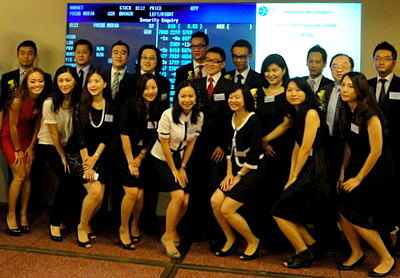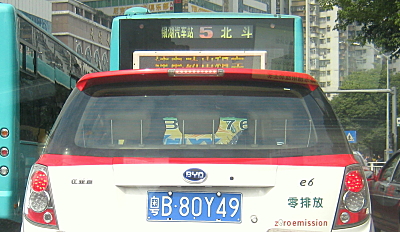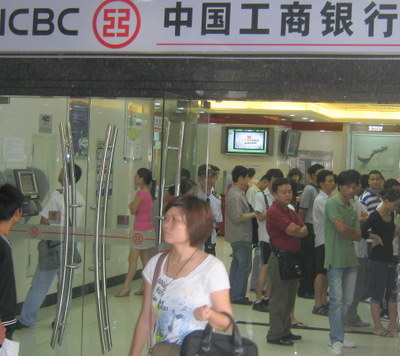
Some firms are confident enough in their own merits to list, even in a down market. Focus Media Network (above) celebrates its July listing in Hong Kong. Photo: Aries Consulting
On the one hand we were fervently cheering on our favorite athletes and countries while watching the most memorable opening ceremony ever.
On the other, we helplessly looked on as Wall Street imploded and markets went into freefall.
The next casualty may be the valuation premium that PRC-listed A shares have long enjoyed over their Hong Kong-listed counterparts.
How can we reclaim that pre-Olympian optimism that is now becoming a faded memory?
A Chinese-language piece in Sinafinance said that in the investment world, three years is an eternity.

BYD, a constituent of the Hang Seng China AH Premium Index, has always enjoyed a premium in the PRC, perhaps due to its 'National Champion' for electric vehicles promotions. Its shares in Hong Kong are currently at 13.98 hkd while its A-share counterparts in Shenzhen are at 20.79 yuan. Photo: Andrew Vanburen
Perhaps one of the most telling harbingers of tougher times to come, Sinafinance said, has been the creeping irrelevance of a once critical tool for investors in either H shares (PRC incorporated firms listed in Hong Kong) or A shares (Chinese firms listed in either Shanghai or Shenzhen) – the Hang Seng AH China Premium Index.
Launched in July 2007 (i.e. before The Crash), the Hang Seng AH China Premium Index was devised to be a handy tool helping investors quickly grasp the price divergence between A shares and their H-share listed counterparts in Hong Kong.
Chinese A shares are not readily available to individual foreign investors, but their H-share counterparts traded in Hong Kong are.

ICBC, China's largest bank, is closer to parity for its cross-border valuations: 4.77 hkd/7.24 p/e vs 4.10 yuan/7.59 p/e.
Photo: Andrew Vanburen
Photo: Andrew Vanburen
The sub-index describes itself as thus:
The Hang Seng China AH Premium Index measures the absolute price premium (or discount) of A shares over H shares for the largest and most liquid mainland China companies with both A-share and H-share listings ("AH Companies"). Due to the differences in the market characteristics of the Mainland and Hong Kong stock markets - such as different market environments, different groups of investors and the inconvertibility between A shares and H shares - the A-share and H-share prices of the same company generally diverge.
Although the relative value of the paired counters has naturally fluctuated over the past few years (mainly due to drastic leaps and corrections in the A shares rather than vice versa), the PRC-listed counters have consistently traded at pricier levels than their H-share partners.
To put things in perspective, A shares currently trade an average of 18.2% higher than their H-share cousins, Sinafinance said.

Mainland investors in Tsingtao beer’s A shares are apparently less juiced-up on China’s most popular export brand than investors in the Hong Kong-listed counterpart (44.95 hkd/26.16 p/e vs 34.34 yuan/24.39 p/e). Could it be outsiders are more excited about PRC domestic consumption plays than Chinese themselves?
Photo: Tsingtao Brewery
Photo: Tsingtao Brewery
On the upbeat side, they also generally agree that this development is long overdue, and will help Shanghai (and to a lesser extent Shenzhen) become more ‘market-based’ financial markets that will be more attractive to investors overall once the dust has settled and compete more efficiently with Hong Kong.
In fact, Sinafinance said the Hang Seng AH China Premium Index may not be long for this world, as valuations for the same firm’s shares selling on either side of the de facto border separating the PRC from Hong Kong are gradually entering an era of convergence.
The peak likely came on January 22, 2008, when the Index’s value hit 213.47 points, when nearly all of the constituent A shares on the Index were more expensive than their H-share counterparts.
Then followed a steady decline in the valuation premium enjoyed by A shares, exacerbated by the onset and staying power of the global financial crisis later that year.
Since late 2008, both impartial observers and A-share apologists have generally felt that the convergence between the two has accelerated too rapidly, often citing the still robust demand for securities by cash-rich Mainland Chinese retail investors.
The sovereign debt crises in the EU and the budgetary imbroglio in the US affect Hong Kong and Mainland China alike, and there is seemingly no way to simply focus on domestic consumption to cure all ills.
Therefore, with the convergence of bourse opening times implemented in March for both capital markets in the PRC and Hong Kong as well as the lingering pessimism affecting both markets, valuation parity may be something on the lips of analysts in the near term.
In times of economic bounty, just as a rising tide lifts all boats – the opposite is also likely to prove true.
See also:
Troubled PRC Automaker BYD Eyes 70% Staff Cuts... Will Buffett Bail Too?
What Bear Market? 11 IPOs Eye 77 Bln Hkd In Sept, Including Hongguo







